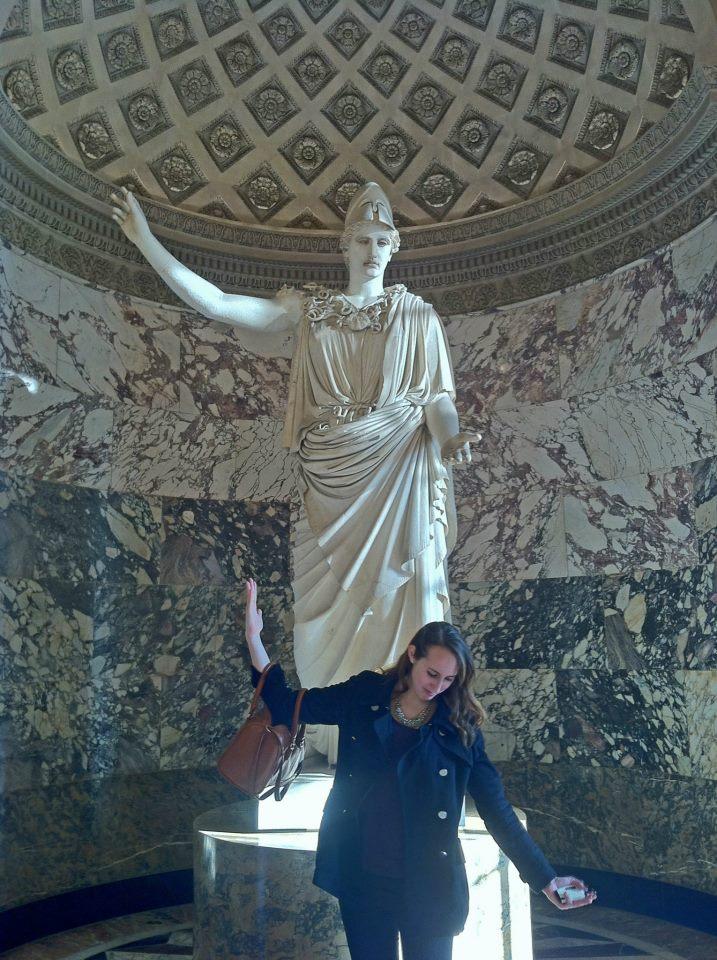
Talking Points
A friend recently tried explaining the difference between singing in French and in English. In French, the Beatles would never have reached the same level of stardom, he said—would never have won over the world with that cheery refrain: “love, love love...love, love, love.” In English the lyrics will always ultimately bow to the tune. French is the opposite: the tune sustains the thought and fills in the background but yields, then, to the words and their meaning, to the language.
This is why there aren’t many internationally renowned French pop stars, I guess. It is also why I feel a vulnerable uneasiness in relearning how to speak.
This is not the first time I have tried to learn a language. I’m accustomed to the constant mild humiliations: the questions misunderstood and mis-answered; the errant qualifier; the slightly furrowed brow of the shopkeeper when I ask for half a kilo of tomatoes. On Sundays I walk up Rue de Rennes, right on Vaugirard, left on Condé to an open-air market. I slow down as I approach to delay the moment when I will have to start talking, so that I can pretend—for a moment—that this city is also mine.
I am used to feeling flatter, less-dimensional, in a foreign language. I have the words to talk about myself—Je viens des Etats-Unis, j’étudie l’histoire et la littérature—yet the words form a layer, thin but sturdy, keeping me largely within the bounds of banal description. I never know if I’m the same person in a language not my own.
But for some reason the stakes seem higher here in Paris. Maybe it’s the emphasis placed on the nuance of speech. Evaluations for class at my university, Sciences Po, include very little writing: courses are organized around the exposé, a 10-15 minute rigidly structured presentation of a topic followed by questions by the class and examination by the professor. For my first exposé I tried to cram in information, pack in analysis and details. My classmates and professor told me to slow down. More important than what I had to say was how I said it—I needed to savor the words more, allow them to linger. A classmate tells me that pure facts matter less here. An education entails learning to speak intelligently about a subject, any subject: the countless exposés are preparation for an inventory of possible sentences, an inventory of articulate turns of phrase.
It is an environment that I am beginning to understand but that in practice remains tantalizingly inaccessible. The gap between my writing and speaking has not yet shrunk to my ideal (nonexistent) dimensions. By the time I form a coherent thought the class has jolted ahead and onto the next theory couched, inevitably, in the comforting cocoon of Foucault. Words proliferate and the language chugs on and it is all very beautiful but still just out of reach.
There’s an expression here for when friends gather for fun but the conversation expands and extends beyond daily matters. They start to quote famous thinkers, bounce ideas off each other, paint grandiose themes in broad rough strokes. Refaire le monde, it’s called: remaking the world. It can be translated, I think, as anything from “putting the world right” to “acting the philosopher.” This is what we do often, I am told, after a night of beers and smoke, in a tiny 6th floor studio in the 5th arrondissement. Novels de poche by Boris Vian perch precariously on a shelf next to a messy stack of vinyls: someone chooses one at random, sets the dialogue to jazz. Everything is said and nothing done and in this we are all complicit.
I love it and want to chime in, but my sentences, though sturdy, are stiff. They lack the shades of gradation that would allow me to contribute, that would fit into the self-aware atmosphere of student pseudo-intellectuals. My jokes are unsubtle; my attempts at irony fall flat. Je suis plus intelligente en anglais, je vous jure—I promise I’m smarter in English—I want to object, though I don’t.
I know this is not a disaster. I am, for instance, learning to listen. That night in the studio I say nearly nothing, not because I have nothing to say, but because nothing I say is quite ready. Luckily they understand—it’s obligatory here to spend the third year abroad, so they tell me they remember what it was like for them in Istanbul, in Melbourne, in Prague. It will get better, they say, easier. Meanwhile the words wash over me and I wade through them and try to digest them and stay afloat, if just barely.
I am learning but am also scared of what I am missing. If there’s something more real than this city’s romantic mystique, I think it’s to be found in the language—to be sought in the phrases that I still largely lack. They are the phrases situated somewhere in between asking for tomatoes and remaking the world. So much in French is only hinted at: entire syllables are hardly aspirated, almost swallowed. So much in France is likewise oblique, lurking beneath a barrier I would so like to pierce. In a place where everything seems to trade on language, I am struggling to find the words.
—Victoria A. Baena ’14, a Magazine staff writer, is a history and literature concentrator in Mather House. Elle écrit ce qu’elle n’arrive pas à dire.


